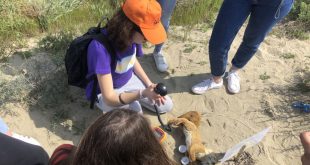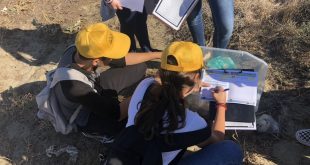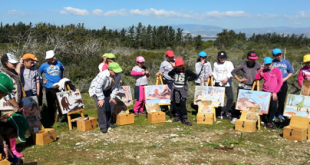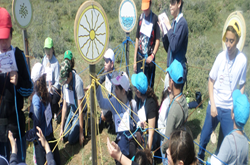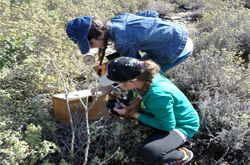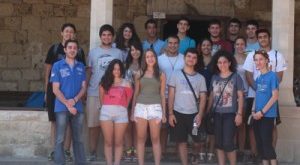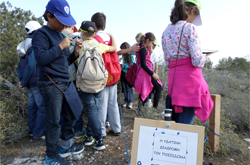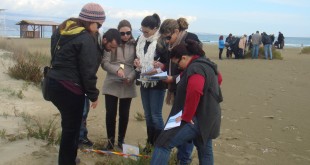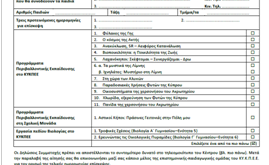The Cyprus Center for Environmental Research and Education in cooperation with the Radio Channel “Kanali 6” (98,6 FM) of the Holy Church of Limassol daily presents the broadcast “Environment for All”, which deals with environmental issues. The broadcast is organized and presented by the Biologists – Environmentalists Dr. Andreas Hadjichambis and Dr. Demetra Paraskeva-Hadjichambi. The program broadcasts daily (Monday – Friday) at 8:40 a.m and it lasts for 5 minutes.
Below you can find short environmental articles, relating to the presentation of environmental issues.
Environmental Crime on the Coast
The objectives of the Environmental Education Program “Environmental Crime on the Coast” are the students: To get to know the ecosystem of the coast and the coastal dunes of the area of Akrotiri. Discover how the coastal dunes are created. To explore the relationship between biotic and abiotic factors and ...
Read More »
Environmental Crime on the Coast
The Environmental Education Programs of the CYCERE are addressed towards all the schools of the Primary and Secondary Education and are provided FREE OF CHARGE. Max students: 30. In some exceptional cases the CYCERE may receive up to 40 students (after agreement with staff of the CYCERE). Information tel. 25954954. Send your application as ...
Read More »
EarthKeepers
Cyprus Center for Environmental Research and Education, making an agreement with the Institute for Earth Education (IEE), proceeded to the translation, edition and adaptation of the Program in Greek. The program is offered at the Cyprus Center for Environmental Research and Education (CYCERE) in collaboration with the Institute for Earth Education (IEE), ...
Read More »
EarthKeepers
The Earthkeepers program begins with an invitation from a mysterious character known as the E.M., inviting the students to visit the CYCERE (Earthkeepers Training Center) in order to become Earthkeepers. A few weeks later, students arrive in order to spend three days at the CYCERE Exploring the natural environment, students ...
Read More »
EarthKeepers
The Earthkeepers program could be described as an enchanting learning adventure. This program aims to help students: To understand four basic ecological concepts (energy flow, cycling of materials, inter dependencies, changing forms). To develop positive environmental attitudes To undertake personal action in order to reduce their impact on Earth. To ...
Read More »
Summer Clubs
From July 15 to July 19, 2013, the Department of Communication and Internet Studies of the Cyprus University of Technological (CUT), in cooperation with the Cyprus Centre for Environmental Research and Education (CYCERE), organized a summer club for high school students. The club was under the auspices of the European ...
Read More »
EarthKeepers
The Earthkeepers program is addressed towards the students of the 4th, 5th and 6th grade of the primary school as well as towards the students of the 1st grade of the secondary school and is provided FREE OF CHARGE. Max students: 25. In some exceptional cases the CYCERE may receive up ...
Read More »
Environmental Education Programs (home 1)
Download the pdf document of CYCERE’s Guide of Environmental Education Programs 2020-2021 by clicking here Moreover, you can download the pdf documents of CYCERE’s Guides of Environmental Education Programs previous academic years, which are sent out to all primary and secondary schools in the beginning of the academic year: Guide of ...
Read More »
Teachers' Training
The CYCERE is actively involved in the training of pre-service teachers on issues of Environmental Education. More specifically, the CYCERE is actively involved in the training of both pre-service teachers of primary education studying in the Department of Education and in the training of pre-service biologists of Higher Education.
Read More »
Educational guide 2022-2023 & Participation Form
Download the word document of CYCERE’s form of application for Environmental Education Programs 2022-2023 by clicking here
Read More »
 Κυπριακό Κέντρο Περιβαλλοντικής Έρευνας & Εκπαίδευσης – Κυκπεε
Κυπριακό Κέντρο Περιβαλλοντικής Έρευνας & Εκπαίδευσης – Κυκπεε
